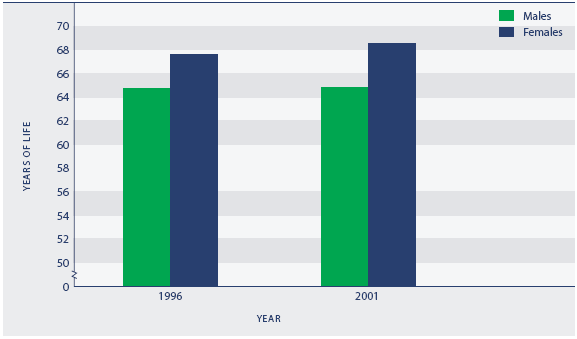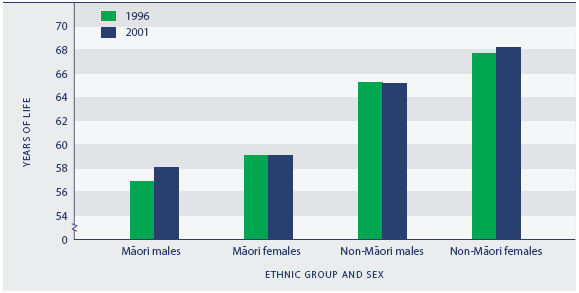Health expectancy
Definition
The number of years a person could expect to live in good health if current mortality and morbidity rates persist.
The particular measure of health expectancy used here is the number of years a person could expect to live independently, ie live without any functional limitation requiring the assistance of another person or complex assistive device. Hence it is also described as independent life expectancy.
Relevance
Health expectancy is a summary measure of population health that captures both the "quantity" and "quality" of life dimensions of physical and mental health. Independent life expectancy at birth is a positive measure, capturing expectations of a life free from functional limitation that requires assistance. Improvements in health expectancy reflect changes in social and economic conditions, lifestyle changes, medical advances and better access to health services.
Current level and trends
In 2001, males had an independent life expectancy at birth of 64.8 years. The figure for females was 68.5 years, a difference of 3.7 years. For the total population, independent life expectancy at birth improved for females since 1996 (67.5 years) but not for males (64.7 years). This resulted in an increase of almost one year in the overall sex gap in independent life expectancy at birth between 1996 and 2001.
Figure H1.1 Independent life expectancy at birth, by sex, 1996 and 2001

Source: Ministry of Health, revised data
Ethnic differences
Only partial (0–85 years) independent life expectancy can be estimated for ethnic comparisons because of the small number of Māori aged over 85 years. These ethnic-specific statistics are not comparable with those for the total population.
There are large differences between Māori and non-Māori in their probability of living a long and healthy life. Revised estimates for 2001 show a newborn Māori male had a partial (0–85 years) independent life expectancy of 58.0 years, compared to 65.2 years for a non-Māori male, a gap of 7.2 years. The difference is greater for females: a Māori female born in 2001 could expect to have a partial independent life expectancy 9.2 years less than her non-Māori counterpart (59.0 years, compared to 68.2 years for non-Māori females).
Between 1996 and 2001, partial (0–85 years) independent life expectancy improved marginally for Māori males and non-Māori females, but there was no change for non-Māori males and Māori females.
The sex gap in independent life expectancy at birth for Māori narrowed between 1996 and 2001.
Figure H1.2 Partial independent life expectancy at birth, Māori and non-Māori, by sex, 1996 and 2001

Source: Ministry of Health, revised data
Note: These Māori/non-Māori comparisons in independent life expectancy are based on estimates for the 0–85 years age group because of the small number of Māori over 85 years of age
|


